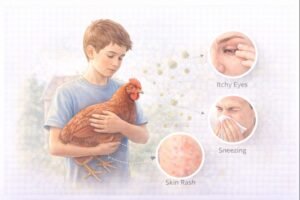Allergy to Live Chickens: Symptoms, Causes & Management (Canadian Overview)

-
Sneezing or runny nose
-
Itchy or watery eyes
-
Coughing or wheezing
-
Skin rashes or hives
Chicken allergies can also aggravate existing respiratory conditions such as asthma, allergic rhinitis, and eczema — an important consideration for families living in rural settings, farming communities, or keeping backyard poultry (a trend that has grown across Canada in recent years).
Why Chicken Allergies Develop
Allergic reactions occur when the immune system mistakenly identifies harmless proteins from animals as a threat. The body produces IgE antibodies, triggering mast cells to release histamine and other inflammatory chemicals.
Exposure may occur through:
-
Inhalation (dust, feathers, coop particles)
-
Direct contact (handling birds, touching feathers)
-
Droppings & coop environment
Although many allergies begin in childhood, new sensitivities can develop later in life — especially after repeated exposure.
Diagnosis
Anyone who repeatedly develops symptoms after handling chickens should discuss testing with a healthcare professional. Diagnostic options may include:
-
Skin prick testing
-
Blood testing for IgE antibodies
-
Exposure history review
This helps differentiate chicken allergy from other rural environmental exposures (hay, dust mites, moulds, pollens) which can present similarly.
Management & Prevention
The most effective strategy is limiting or avoiding exposure where possible. When avoidance isn’t realistic (e.g., farming or 4-H programs), options may include:
✔ Antihistamines
✔ Nasal corticosteroid sprays
✔ Protective clothing (gloves, coveralls)
✔ Respiratory protection (N95-type masks)
✔ Regular coop sanitation to control airborne dust
Allergy immunotherapy (“allergy shots”) may provide long-term symptom reduction in select cases.
Canadian Training
Understanding environmental and respiratory allergens is relevant to health and safety, especially in agricultural settings, animal-handling occupations, and rural workplaces.
St Mark James Training provides workplace safety education, and courses in First Aid, CPR, and AED use—skills that help Canadians respond confidently to a range of medical situations, including breathing difficulties and allergic reactions.
Educational Disclaimer
This article is for general learning and public education only. It is not a medical diagnosis or treatment plan. Individuals with persistent or severe symptoms should seek assessment from a qualified healthcare professional.
